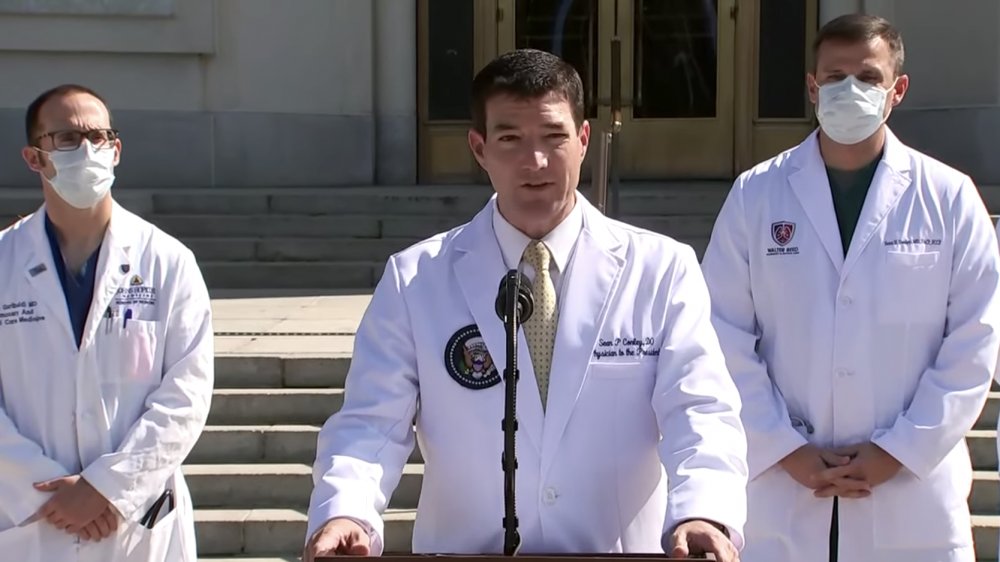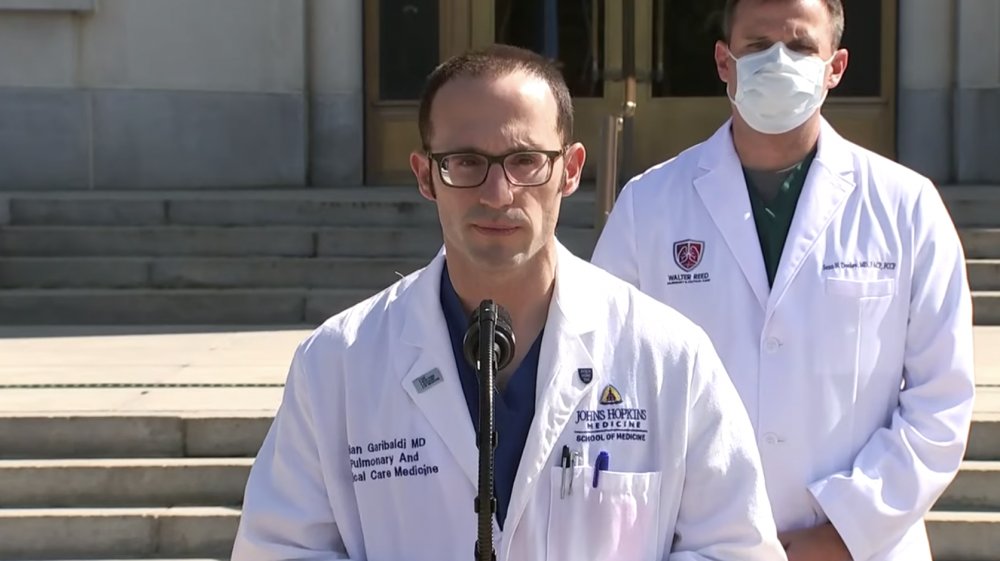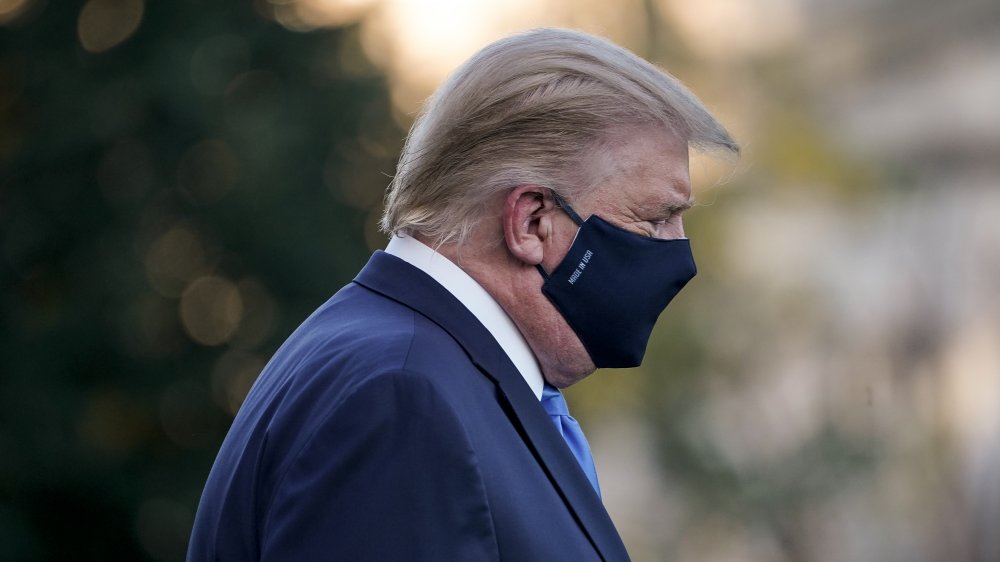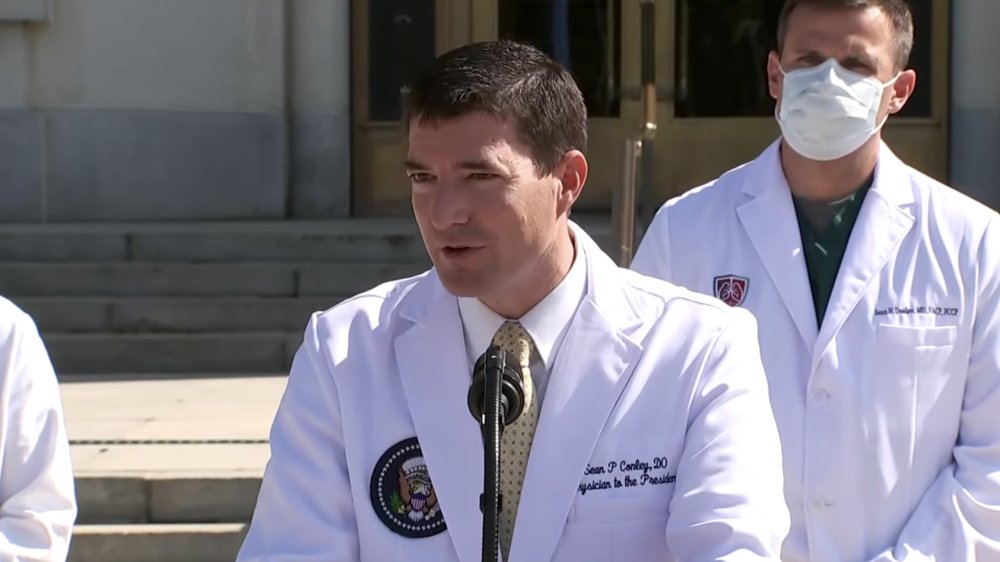Why The Latest Health Update From Trump's Doctor Is Raising Eyebrows
President Donald Trump's medical team has delivered a second health update, and while it cleared up some confusion generated by the first news conference, it has left many as baffled as they felt on Saturday about the true state of Trump's health.
One of the causes of Saturday's misunderstanding came from Dr. Sean Conley's denial that the president had received supplemental oxygen. During his second media briefing on Sunday, the president's physician, Sean Conley, began by coming clean on the fact that Trump had experienced two drops in what is known as "oxygen saturation," which represents the level of oxygen your red blood cells are carrying. Per Mayo Clinic, normal blood oxygen levels should range between 95 to 100 percent, anything below 90 percent is considered low.
When asked about the misinformation Conley replied: "That's a good question. I was trying to reflect the upbeat attitude that the team, the president, this course of illness had, [I] didn't want to give any information that might steer the course of illness in another direction and in doing so, it came off as though we were trying to hide something, which wasn't necessarily true. The fact of the matter is, he's doing really well. And as the team said, if everything continues to go well, we're going to start discharge plan of going back to the White House" (via NBC). This comes after Conley's course correction yesterday as he walked back other statements on the timeline of Trump's illness.
Conley's briefing led to more unanswered questions
Unfortunately, as it did yesterday, the news conference again triggered more questions and issues than they addressed. PBS White House Correspondent Yamiche Alcindor reacted to the declaration that the president was ready to return to the White House by tweeting: "Dr. Conley is hinting that President Trump could be out of Walter Reed as early as tomorrow. Sources have told me the president has been working the phones & is anxious to get back on the campaign trail. They say he will 'sling shot' out of hospital & wants to do events asap."
Other than Conley's declaration that the president was close to being discharged and that he had misled the media, a third comment caught the attention of reporters, this time involving the use of a particular drug. In outlining the president's course of treatment, another physician on Trump's team, Dr. Brian Garibaldi, noted that the president had been given a second in a five-day dose of the popular COVID-19 treatment Remdesivir, and because of the blood oxygen dips, Trump was being put on a steroid inhaler known as dexamethasone (via NBC), which the WHO has said was tested in the UK and was found to be of benefit for patients critically ill with coronavirus.
The steroid is best used on patients critically ill with COVID-19
In a study reported by CNN in early September, researchers recommended that steroids like dexamethasone should be used as standard care for patients who were "critically ill" with COVID-19. The University of Bristol's Jonathan A. C. Sterne, one of the paper's authors, said they had found that "the treatment with corticosteroids reduces mortality of 40 percent to 32 percent, that's a 20 percent relative reduction, or if you like to a better way to think about it, an easier way to think about, it is that out of every hundred patients treated with corticosteroids, eight additional patients do not die."
But the WHO does not recommend using the steroids in patients with non-severe COVID-19, because more research needed to be done in this area.
The steroid doesn't help anyone who isn't critically ill
A separate report by CBS on the same drug said that it did not appear to be of any help to patients who were not severely ill. "In the people who were intubated, who needed a breathing tube, their mortality went from 40 percent down to 28 percent. ... And if they needed just oxygen, [mortality] went from 25 percent to 20 percent. [But] if they were less sick, it didn't seem to make a difference," meaning that less severe cases would not be given this treatment, CBS' chief medical correspondent Jon LaPook said.
Doctors active on social media are now raising questions about the use of the steroid. One of them is Walid Gellad, an internal medicine doctor at University of Pittsburgh's Graduate School of Public Health, who pointed out: "The [NIH] Panel recommends against using dexamethasone for the treatment of COVID-19 in patients who do not require supplemental oxygen (AI)."



